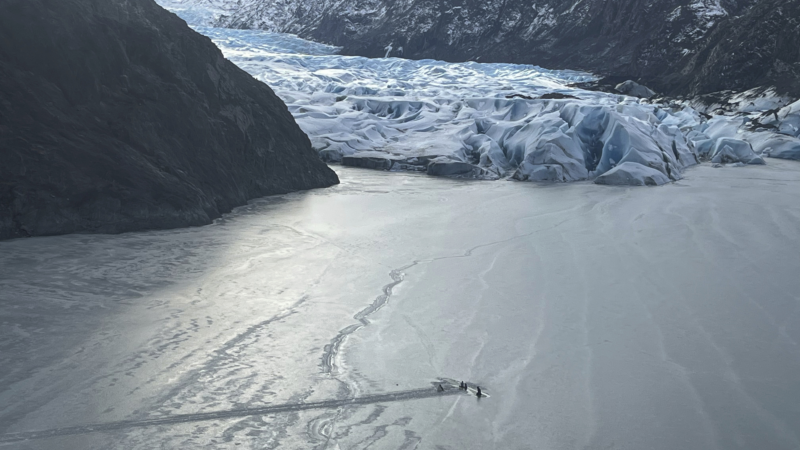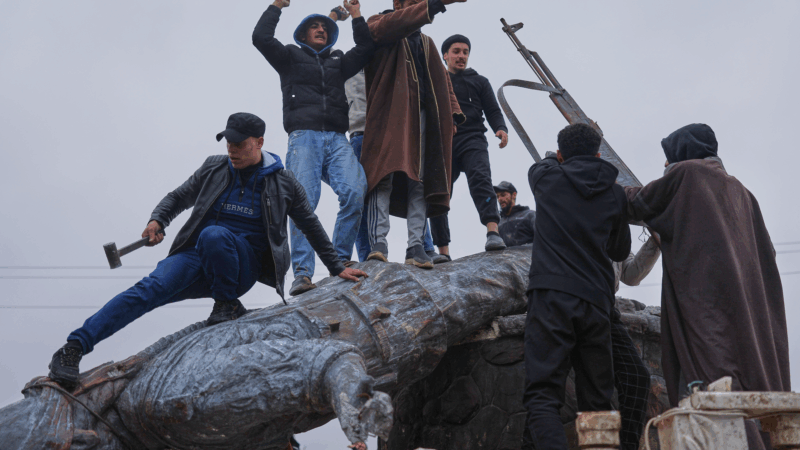Pilot and 2 children survive a night on airplane wing after crashing into Alaska lake
ANCHORAGE, Alaska — A pilot and two girls survived on the wing of a plane for about 12 hours after it crashed and was partially submerged in an icy Alaska lake, then were rescued after being spotted by a good Samaritan.
Terry Godes said he saw a Facebook post Sunday night calling for people to help search for the missing plane, which did not have a locator beacon. On Monday morning about a dozen pilots including Godes headed out to scour the rugged terrain. Godes headed toward Tustumena Lake near the toe of a glacier and spotted what he thought was wreckage.
“It kind of broke my heart to see that, but as I got closer down and lower, I could see that there’s three people on top of the wing,” he told The Associated Press on Tuesday.
After saying a prayer, he continued to approach and saw a miracle.
“They were alive and responsive and moving around,” Godes said, adding that they waved at him.
The missing Piper PA-12 Super Cruiser, piloted by a man with two juvenile immediate family members aboard, was on a sightseeing tour from Soldotna to Skilak Lake on the Kenai Peninsula.
The three were rescued on the eastern edge of Tustumena Lake on Monday by the Alaska Army National Guard after Godes alerted other searching pilots that he had found it. Another pilot, Dale Eicher, heard Godes’ radio call and related it to troopers since he was closer to Skilak Lake and figured he had better cell reception. He was also able to provide the plane’s coordinates to authorities.
“I wasn’t sure if we would find them, especially because there was a cloud layer over quite a bit of the mountains, so they could have very easily been in those clouds that we couldn’t get to,” Eicher said. But finding the family alive within an hour of starting the search “was very good news.”
The three were taken to a hospital with injuries that were not considered life-threatening, Alaska State Troopers said.
Godes said many miracles were at play, from the plane not sinking, to the survivors being able to stay atop the wing, to them surviving nighttime temperatures dipping into the 20s (subzero Celsius).
“They spent a long, cold, dark, wet night out on top of a wing of an airplane that they weren’t planning on,” Godes said.
Alaska has few roads, leaving many communities to rely on small airplanes to get around.
Last month 10 people died when a small commuter plane that was overweight by half a ton crashed onto sea ice in the Norton Sound, near Nome on the state’s western coast.
And five years ago, a midair collision near the Soldotna airport claimed seven lives including that of a state lawmaker.
For this week’s rescue, the National Guard dispatched a helicopter from its base in Anchorage.
The initial plan of using a hoist to pluck them from the wing proved too dangerous, as the the smallest girl was being buffeted and blown around by the wind created by the helicopter, said Lt. Col. Brendon Holbrook, commander of the 207th Aviation Regiment. So instead the aircraft hovered to the side and pulled them on board.
Personnel reported that the girls were surprisingly dry but the man had been in the water at some point, Holbrook said: “We don’t know to what extent, but he was hypothermic.”
Holbrook said he was told they had basic clothing one would wear on small planes without very good heating systems, but nothing sufficient to keep warm outside in wintry temperatures with cold winds blowing on the lake.
“It was literally the best possible scenario and outcome,” Holbrook said. “Ultimately the crew of that airplane were lucky, because from what my guys told me, that plane was in the ice with the tail refrozen, and if that tail hadn’t refrozen, it would have sunk.”
The 60,000-acre Tustumena Lake, the largest freshwater body on the Kenai Peninsula, is about 80 miles southwest of Anchorage, with nearby mountains and a glacier.
It has been described by the Alaska Department of Fish and Game as “notorious for its sudden, dangerous winds,” with conditions that can cause havoc for both boats and planes.
“The terrain helps turn the winds around, and occasionally they get a little squirrelly,” said Michael Kutz, a meteorologist at the National Weather Service in Anchorage.
Godes agreed that the area is always windy and the water can be whipped up into waves.
“Then just the way it’s placed right there at the heel of that, or at the toe of that glacier where you’ve got mountains on both sides, you know, just a few miles to the west, you’ve got Cook Inlet running back and forth with huge temperature and tidal swings every day,” he said. “It’s just a recipe for chaos and for turbulence.”
There was no indication yet why the plane crashed.
Mark Ward, an investigator with the National Transportation Safety Board’s Alaska division, said the pilot had not yet reported the accident, nor had the agency been able to contact him. Efforts were to be made again Wednesday to speak to him.
Syrian government announces a ceasefire with the Kurdish-led Syrian Democratic Forces
Syria's new leaders, since toppling Bashar Assad in December 2024, have struggled to assert their full authority over the war-torn country.
U.S. military troops on standby for possible deployment to Minnesota
The move comes after President Trump again threatened to invoke the Insurrection Act to control ongoing protests over the immigration enforcement surge in Minneapolis.
Martin Luther King Jr. had a dream … about health care
A doctor from Nigeria tells what Martin Luther King Jr. taught him about health, Justice and inequality.
Sunday Puzzle: It takes two
Ilyse Levine-Kanji of Westborough, Massachusetts plays the puzzle with Weekend Edition Puzzlemaster Will Shortz and host Ayesha Rascoe.
Venezuela: Maduro’s enforcer Cabello still central to power
The ousting of Venezuela's president raised hopes of change — but the politician now controlling the streets shows how little has really shifted.
Amid ICE clashes, New Hampshire bishop urges clergy to prepare their wills
The Episcopal bishop of New Hampshire told priests protesting ICE to get their wills and affairs in order. Some praise the bishop, while other priests say they never signed up to be martyrs.








